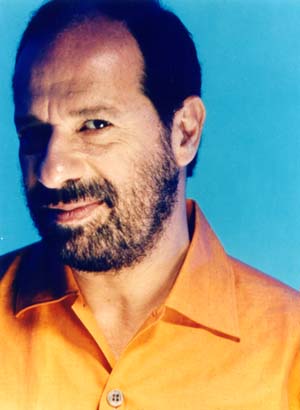
Old churches, narrow streets, colonial houses, mountains - the living remains of African slaves permeate the baroque veins common to all the artists from Minas Gerais, the cradle of many creative, revolutionary geniuses of Brazilian music. João Bosco was born and raised amidst this baroque setting. He spent his childhood in the city of Ponte Nova surrounded by rich mining mountains, accordion music, local bands, radio singers and church choirs. Music was always present in the family–piano, guitar and singing were part of his daily routine. Influenced by his grandmother's bandolin, his mother's violin and his father's musical taste, Bosco soon learned to appreciate Villa-Lobos and Ernesto Nazaré.
As a child, João Bosco enjoyed the daily contact with African rhythms and sounds introduced by the descendants of slaves. This was another major influence in his personal style. In 1958, when he was 12 years old, he was captivated by rock'n roll. He created a band that played Little Richard and Elvis Presley songs. Bosco's musical development was also determined by the Caribbean sounds, boleros and rumba rhythms which he enjoyed as a teenager.
Moving to the city of Ouro Preto to study civil engineering in 1962, Bosco found himself attracted to jazz, particularly to Charlie Parker, Thelonius Monk, Gershwin, Ray Charles, Duke Ellington and Miles Davis, as well as to the music of Dorival Caymmi, João Gilberto and Tom Jobim, who introduced him to Bossa Nova. Having met the great poet Vinícius de Moraes, João Bosco's first illustrious partner, he formed a Bossa Nova group called QUARTETO DE OURO PRETO. In 1967, he visited Rio de Janeiro and saw the sea for the first time. Going back to Ouro Preto to finish his studies, he found out he was no longer the same person.
In 1970, he met Aldir Blanc, a lyricist born in Rio, who became his partner in more than one hundred songs. He consolidated himself not just as a singer but also as a composer. In 1973, after graduating in Engineering, he moved to Rio de Janeiro to dedicate himself exclusively to music. João Bosco appeared on the scenario of the Brazilian popular music during difficult times in the country. His songs were recorded by some of the most important Brazilian singers. Elis Regina, certainly the most sensitive interpreter of Bosco's music, turned dozens of his songs into unforgettable hits. O Bêbado e a Equilibrista became Amnesty International's theme song.
He had a restless time during the eighties while researching different rhythms and sounds, always seeking the new, the revolutionary. He chose not to stick with the stability of the already known. In 1986, he debuted for Sony Music (then CBS) with the album Ai Ai Ai de Mim. a sophisticated release, already pointing out his international reach. American producer and musician Ronnie Foster came to Brazil with sound engineer Keith Seppanen, especially for its recording.
The research process continues in the nineties. The album Zona de sets the beginning of a new partnership with the poets/lyricists Waly Salomão and Antonio Cicero. The singer was the first Brazilian artist to be invited to record MTV Unplugged. His newest project, As Mil e Uma Aldeias (A Thousand and One Villages), is explicitly allusive to the fabulous stories of A Thousand and One Nights.